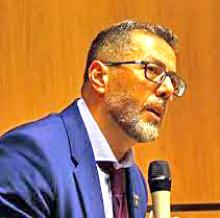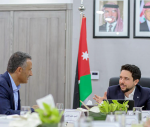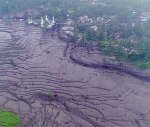You are here
Naming and shaming in Yarmouk
Apr 14,2015 - Last updated at Apr 14,2015
The population of Syria’s Palestinian Yarmouk Refugee Camp, which once exceeded 250,000 and dwindled throughout the Syrian civil war to 18,000, is a microcosm of the story of an entire nation whose perpetual pain shames us all.
Refugees who escaped the Syrian war or are displaced in Syria itself are experiencing a cruel reality under the harsh and inhospitable conditions of war, ignored by all.
Many of those who remained in Yarmouk were torn to shreds by the barrel bombs of the Syrian army or victimised by malicious, violent groupings that control the camp, including Jabhat Al Nusra and, of late, Daesh.
Those who managed somehow to escape injury are starving. The starvation in Yarmouk is also the responsibility of all parties involved, and the “inhumane conditions” in which they subsist, especially since December 2012, are a stigma on the international community in general, and the Arab League in particular.
These are some of the culprits in the suffering of Yarmouk:
— Israel, which bears direct responsibility for the plight of the refugees in Yarmouk who are mostly the descendants of Palestinian refugees from historic Palestine, especially the northern towns, including Safad, which is now inside Israel.
The camp was established in 1957, nearly a decade after the Nakbeh, the “Catastrophe” of 1948, which saw the expulsion of nearly a million refugees from Palestine. It was meant to be a temporary shelter, but it became a permanent home. Its residents never abandoned their right of return to Palestine, a right enshrined in UN Resolution 194.
Israel knows that the memory of the refugees is its greatest enemy, so when the Palestinian leadership requested that Israel allow the Yarmouk refugees to move to the West Bank, Israeli Prime Minister Benjamin Netanyahu had a condition: that they renounce their right of return. Palestinians refused.
History has shown that Palestinians would endure untold suffering and not abandon their rights in Palestine.
The fact that Netanyahu would place such a condition is testimony not just to Israel’s fear of the Palestinian memory, but also to the political opportunism and sheer ruthlessness of the Israeli government.
— The Palestinian Authority, which was established in 1994 based on a clear charter whereby a small group of Palestinians “returned” to the occupied territories, set up a few institutions and siphoned billions of dollars in international aid in exchange for abandoning the right or return of Palestinian refugees, and ceding any claim on real Palestinian sovereignty and nationhood.
When the civil war began in Syria quickly engulfing the refugees, a reality that should have been expected, President Mahmoud Abbas’ PA did very little, as if the matter had no bearing on the Palestinian people as a whole.
True, Abbas made a few statements calling on Syrians to spare the refugees, as the issue was essentially a Syrian struggle, but not much more.
When Daesh took over the camp, Abbas dispatched his labour minister, Ahmad Majdalani, to Syria. The latter said that the factions and the Syrian regime would unite against Daesh, which if true, is likely to ensure the demise of hundreds more.
If Abbas had invested 10 per cent of the energy he spent in his “government’s” media battle against Hamas, or a tiny share of his investment in the frivolous “peace process”, he could have at least garnered the needed international attention and backing to treat the plight of Palestinian refugees in Syria’s Yarmouk camp with a degree of urgency. Instead, they were left to die alone.
— The Syrian regime. When rebels seized Yarmouk in December 2012, President Bashar Assad’s forces shelled the camp without mercy while Syrian media never ceased to speak about liberating Jerusalem.
The contradiction between words and deeds when it comes to Palestine is an Arab syndrome that has afflicted every single Arab government and ruler since Palestine became the “Palestine question” and the Palestinians became the “refugee problem”.
Syria is no exception, but Assad, like his father before him, is particularly savvy in utilising Palestine as a rallying cry aimed solely at legitimising his regime posing as a revolutionary force fighting colonialism and imperialism.
Palestinians will never forget the siege and massacre of Tel Al Zaatar (where Palestinian refugees in Lebanon were besieged, butchered but also starved as a result of a siege and massacre carried out by right-wing Lebanese militias and the Syrian army in 1976), as they will not forget or forgive what is taking place in Yarmouk today.
Many houses in Yarmouk were turned to rubble because of Assad’s barrel bombs, shells and airstrikes.
— The rebels. The so-called Free Syria Army (FSA) should have never entered Yarmouk, no matter how desperate they were for an advantage in their war against Assad.
It was criminally irresponsible, considering the fact that unlike Syrian refugees, Palestinians had nowhere to go and no one to turn to.
The FSA invited the wrath of the regime, and could not even control the camp, which fell into the hands of various militias that are plotting and bargaining amongst each other to defeat their enemies, who could possibly become their allies in their next pathetic street battles for control over the camp.
The access Daesh gained in Yarmouk was reportedly facilitated by Nusra, which is an enemy of Daesh in all places but Yarmouk.
Nusra is hoping to use Daesh to defeat the mostly local resistance in the camp arranged by Aknaf Beit Al Maqdis before handing the reins of the besieged camp back to Al Qaeda affiliated group.
And while criminal gangs are politicking and bartering, Palestinian refugees are dying in droves.
— The UN and Arab League. Cries for help have been heard from Yarmouk for years, and yet none was heeded. Recently, the UN Security Council decided to hold a meeting and discuss the situation there as if the matter had not been a top priority for many years.
Grandstanding and concerned press statements aside, the UN has largely abandoned the refugees. The budget for UNRWA, which looks after the nearly 60 Palestinian refugee camps across Palestine and the Middle East, has shrunk so significantly that the agency often finds itself on the verge of bankruptcy.
The UN refugee agency, better funded and equipped to deal with crises, does little for the Palestinian refugees in Syria. Promises of funds for UNRWA, which frankly could have done much better to raise awareness and confront the international community over its disregard for the refugees, are rarely met.
The Arab League is even more responsible. It was largely established to unite Arab efforts to respond to the crisis in Palestine, and was supposed to be a stalwart defender of Palestinians and their rights. But the Arabs too have disowned Palestinians as they are intently focused on conflicts of more strategic interests, setting up an Arab army with clear sectarian intentions and aimed largely at settling scores.
— Many in the world. The Syrian conflict has introduced great polarisation within a community that once seemed united for Palestinian rights. Those who took the side of the Syrian regime would not concede for a moment that the Syrian government could have done more to lessen the suffering in the camp.
Those who are against Assad insist that the whole evil deed is his and his allies’ doing.
Both these groups are responsible for wasting time, confusing the discussion and wasting energies that could have been used to create a well-organised international campaign to raise awareness, funds and practical mechanisms of support to help Yarmouk in particular, and Palestinians refugees in Syria in general. But we ought to remember that there are still 18,000 trapped in Yarmouk, and organise on their behalf so that, even if it late, we still do something. Anything.
The writer, www.ramzybaroud.net, is an internationally syndicated columnist, a media consultant, an author of several books and the founder of PalestineChronicle.com. His latest book is “My Father Was a Freedom Fighter: Gaza’s Untold Story” (Pluto Press, London). He contributed this article to The Jordan Times.












